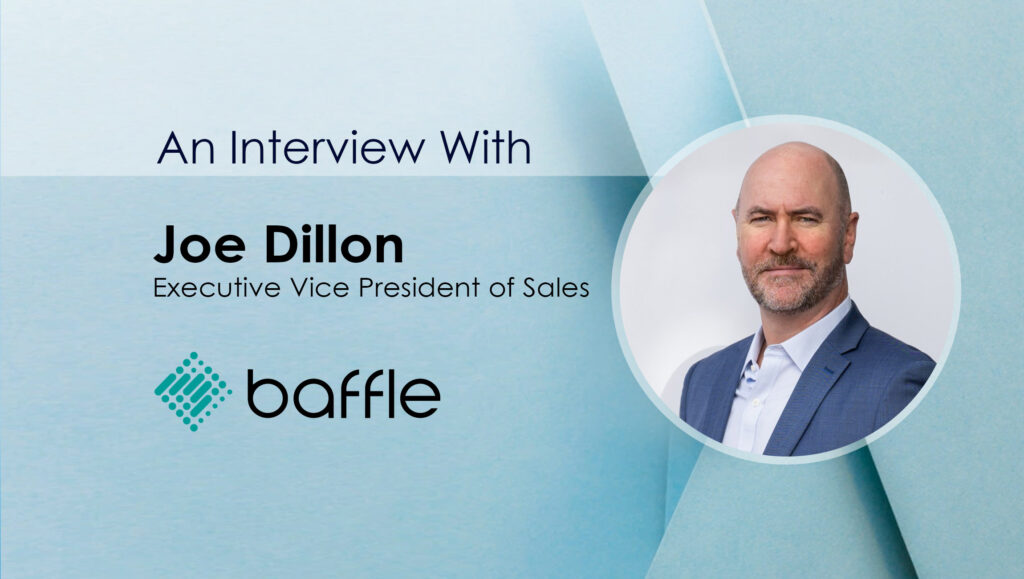Tightly integrated salestech processes and systems are both crucial to an overall sales cycle: Joe Dillon, Executive Vice President of Sales at Baffle shares his pointers in this Q&A:
_________
Welcome to this SalesTechStar chat Joe, tell us about your technology sales journey and more about your current role at Baffle…what inspires you most about being in sales?
My tech sales journey started in the late 1990s. But it was when I was leading sales teams in the early aughts that I observed a few trends that made my decision to join Baffle easy.
In the pre-cloud era of the early 2000s, organizations focused on perimeter security. As the need to share information grew, network security solutions became popular. Regulations centered around protecting sensitive data, and cloud collaboration led to policy-driven solutions like data loss prevention (DLP) and a cloud access security broker (CASB). Then next-Gen DLP and extended detection and response (XDR) solutions were the trend, and now you hear, “The user is the new firewall.”
Challenges of cloud security, complexity, and ultimately cost have prevented most organizations from reaching their data security goals.
Specifically, IT teams face security challenges when moving workloads to cloud environments. And the test and development teams must figure out how to embrace security when trying to use synthesized data vs. real but obfuscated data.
Ultimately, answering the question, “How can I get value out of my data if it has to be encrypted?” is what brought me to Baffle.
Solving big problems elegantly is what I love about tech sales. If you can find a great team of people you enjoy, and a viable and thriving product that has real value to customers, you’ll do well.
As a sales leader, what do you feel are some of the crucial areas that sales teams / leaders don’t focus on enough that you would like to highlight?
Focus and repeatability. I’ve been involved in failed start-ups and successful start-ups. The defining characteristic is always the same. The company that chases the wrong deals fails. The company that understands their market and efficiently culls ill-fitting deals from the pipeline wins.
What are some of the core sales processes and strategies as well as salestech that you’ve often relied on to drive growth and ROI through the years?
I’ve used Salesforce.com since 1999. I used ACT and GoldMine before that. A CRM solution that allows you to efficiently manage engagement with thousands of potential buyers and existing clients is the most important tool in a salesperson’s arsenal.
Having a well-defined and simple selling process that mirrors the buyer’s journey is critical. It’s easy to get caught up in the “more training is better” cycle when things aren’t going well and pull your team off the field too often for too long, losing sight of the real goal.
A better approach is to focus on the elements of sales qualification (“disqualification” is a better way to think about it), account management and planning, project planning, negotiating/closing, and most importantly, new client onboarding, and support that work within your ICPs and with your selling motion.
As for sales tech, I have become a fan of HubSpot recently, as it enables tight sales and marketing synchronization. It helps salespeople increase productivity. As your market journey matures, intent signaling solutions like Bombora help point sellers and business development reps to prospects at precisely the right time.
A few ways in which you feel B2B sales needs to change to drive business impact faster?
I’ve been reading for many years about how well informed and far along the buying journey prospects are before they engage with a seller. In my experience, when that is the case, sellers will often “go through the motions” as if they’re introducing a new concept (regardless of where the buyer is in their journey).
The ability a salesperson has to “get real” with their prospect, stop leaning on training crutches, and to think on their feet will directly influence their success 100 times more than getting an A-plus in their sales training boot camp.
How can leaders do a better job of this? Hire salespersons who challenge you during the interview process and aren’t afraid to say “no” to a prospect. One of my favorite sales stories is about a woman who worked as a customer success manager at one of my previous companies. She joined a web meeting with a client to discuss a new security solution and to gain agreement on moving to a proof of concept (POC). The client had agreed that the CISO would join the call.
When she learned the CISO would not be joining, she ended the call. She refused to discuss the POC without the primary decision maker present, since they’d agreed beforehand that the CISO would attend. Long story short, they got back on a call a week or so later with the CISO and they ultimately ended up adding the new product. You (the seller) are equally important to the outcome of the engagement; your time is as valuable as theirs. Make sure that your prospects and clients understand that. Gain agreement early and often on that front.
Read More: Salestable’s Sales Readiness Platform Wants to Help Enable Founder-Led Sales
A few thoughts on the future of B2B sales and the impact of automation/SaaS/ salestech as sales evolves?
More tightly integrated systems ensure better outcomes. The most useful sales tech system is one where everything that happens on the marketing and business development side is captured and easily accessible and associated with an account record. Each phase of the sales journey — from initial prospect engagement through negotiation and customer management — should be well mapped and include access to relevant client-facing content and tools through the sales cycle. The less time salespersons spend looking for materials, the more time they have to identify and prospect into right targets, and reach their goals and that of the company.

Baffle secures data in the cloud and when shared across the entire analytics pipeline with no performance impact on the user experience. Proven in large-scale environments, only the Baffle Data Protection Service de-identifies sensitive information with zero application changes so companies can responsibly move more data, faster, to the cloud for privacy-preserving analytics in artificial intelligence (AI) and machine learning (ML). Investors include True Ventures, Clearvision Ventures, ServiceNow Ventures [NYSE: NOW], Greenspring Associates, Thomvest Ventures, Engineering Capital, Industry Ventures, and Triphammer Ventures.
Joe Dillon is Executive Vice President of Sales at Baffle
Missed The Latest Episode of The SalesStar Podcast? Have a quick listen here!
Episode 147: Driving Better Customer Revenue Journeys with Holly Procter, SVP of Global Sales at Clari
Episode 146: The Bazaarvoice Growth Story with Zarina Stanford, CMO at Bazaarvoice
Episode 145: The Changing Face of Sales with Mark Wright, VP Sales & Partnerships at Zeitworks





















